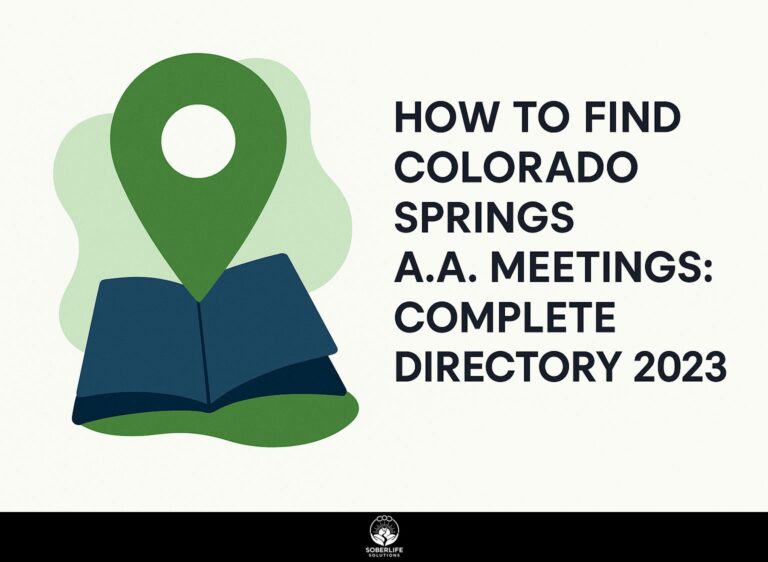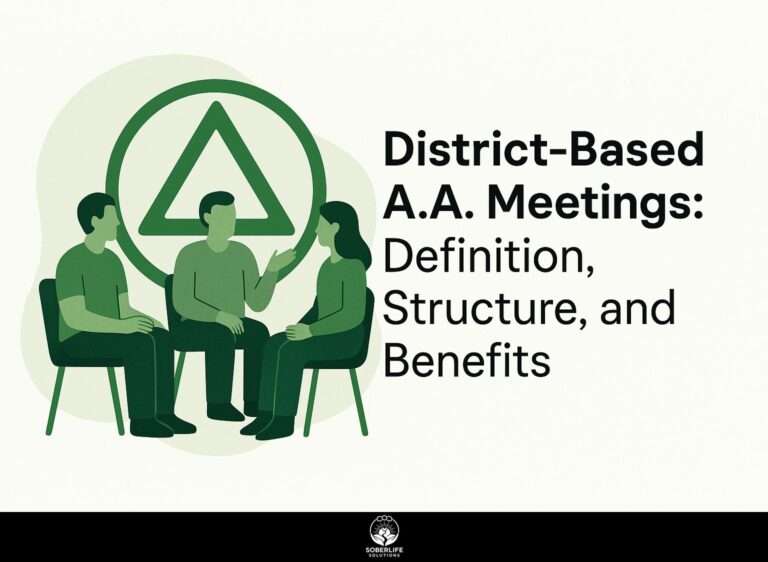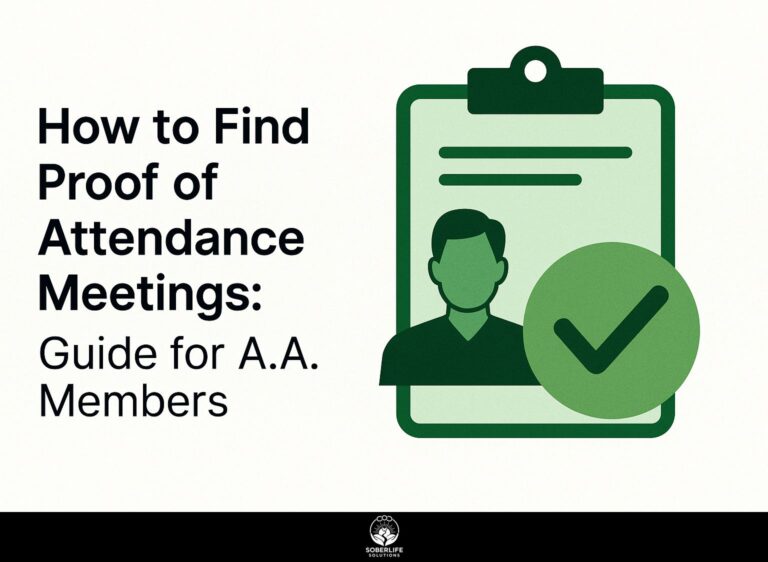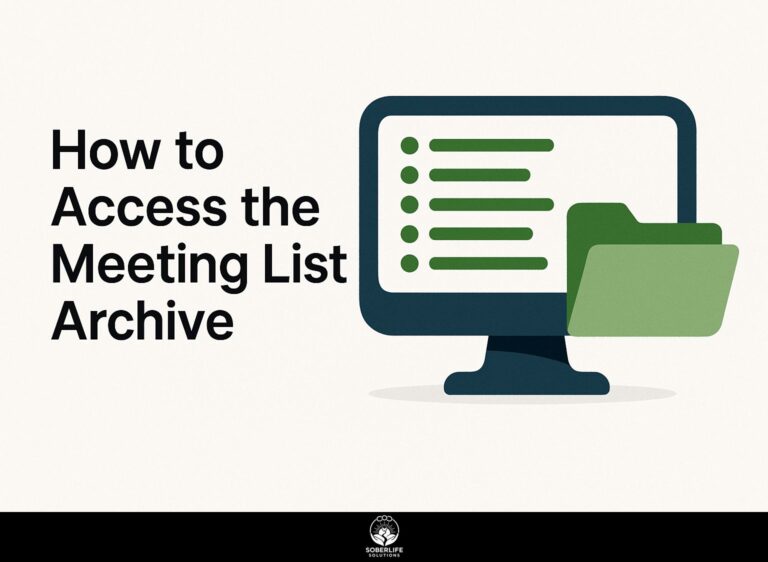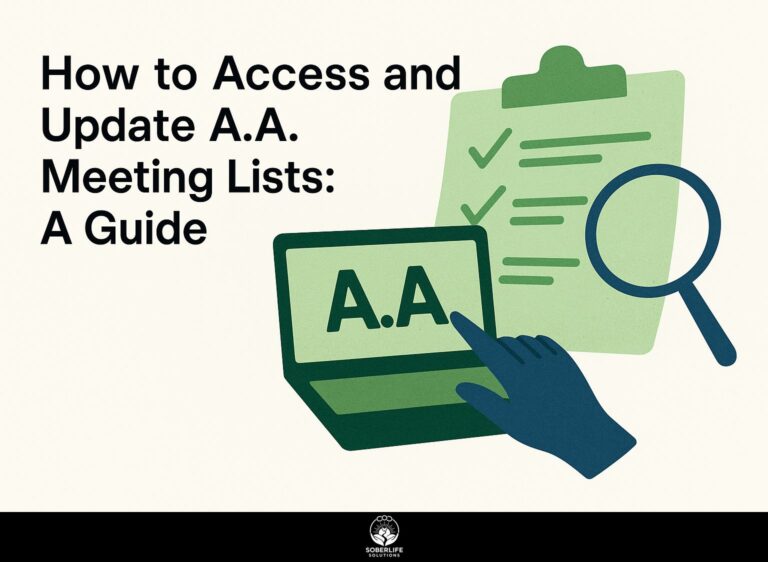LGBTQ A.A. Meetings: Support and How to Find Them
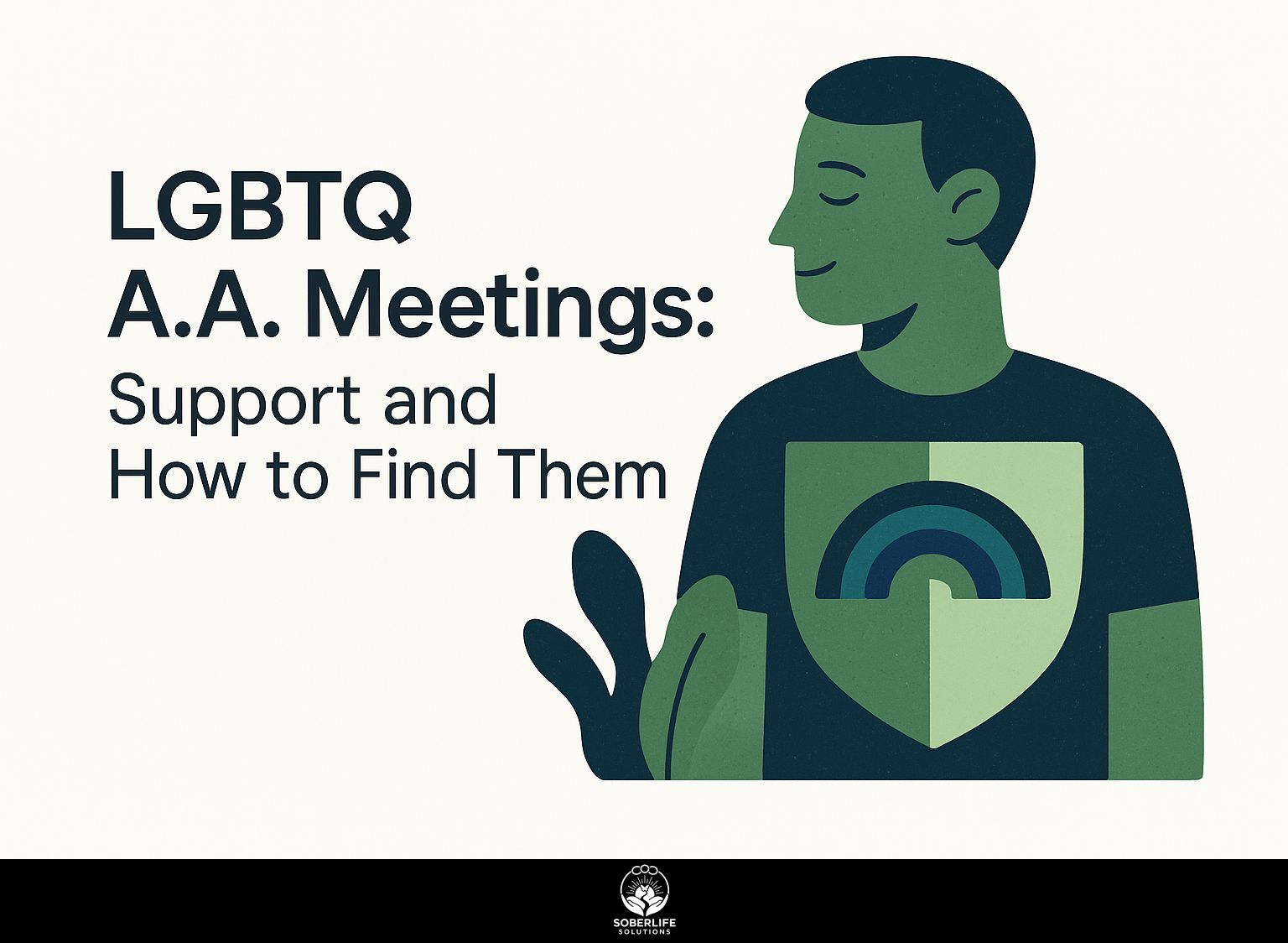
Introduction to LGBTQ A.A. Meetings
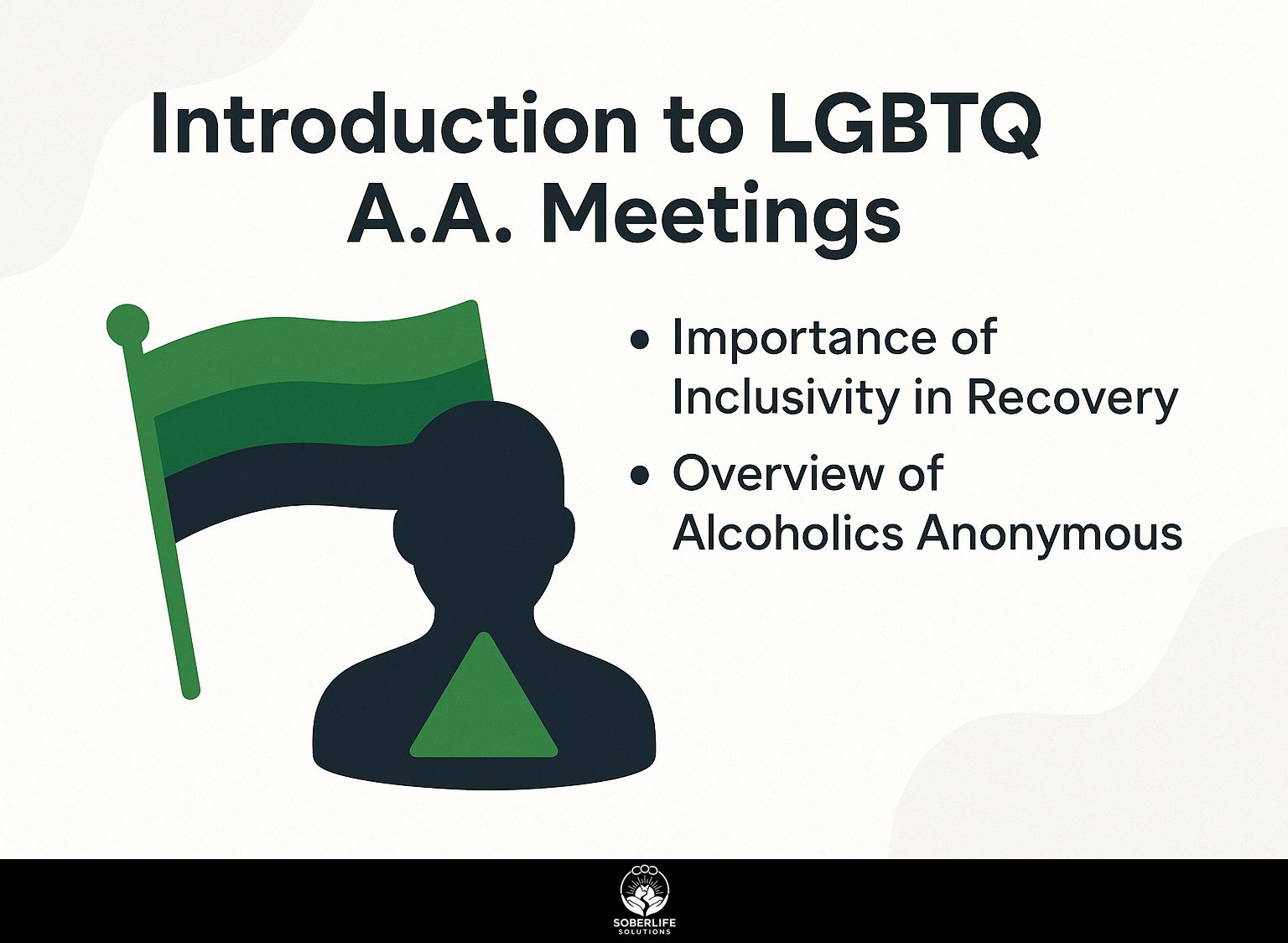
Having a group that offers help is very important for recovery, particularly in LGBTQ A.A. meetings. These gatherings, highlighted in our roundup on GaL-AA.org, offer a safe space backed by the Washington Area Intergroup Association and Alcoholics Anonymous. If you need details about an event or a complete meeting guide, this article will direct you to resources, including choices for those who like dark mode. Come and learn about the essential help accessible for LGBTQ people during their recovery process.
Key Takeaways:
Importance of Inclusivity in Recovery
A positive environment is important for recovery; studies show that it can increase the chances of staying sober by up to 30%.
Including voices from underrepresented groups in recovery programs improves the process, offering different viewpoints that connect with people from different backgrounds.
For instance, programs like Womankind in New York focus on women of color, ensuring that culturally relevant resources are available. Similarly, The Black Men’s Healing Retreat creates a safe space for Black men, addressing specific challenges they face. Additionally, the [importance of LGBTQ+ inclusive alcohol support groups](https://soberlifesolutions.com/lgbtq-inclusive-alcohol-groups/) highlights how tailored environments can further enhance recovery experiences.
These inclusive methods build community support and strengthen personal ties, which lead to better recovery results and increased responsibility among participants. For those interested in a comprehensive overview, this analysis by the London School of Economics offers a deeper dive into inclusive and sustainable approaches to relief and recovery.
Overview of Alcoholics Anonymous
Alcoholics Anonymous (A.A.) is a 12-step program that has helped millions achieve sobriety through peer support and shared experiences.
Founded in 1935, A.A. is built on the principles of mutual support and accountability. Members talk about their experiences, creating a place where healing can happen and highlighting the need to accept that alcohol can control them.
The program has expanded globally, with over 120,000 groups in more than 180 countries. Meetings typically follow a structured format, starting with a reading from A.A.’s literature, followed by sharing personal experiences and discussing step-by-step recovery methods. As Wikipedia outlines in its detailed overview of Alcoholics Anonymous, these methods are grounded in the tradition of fostering community and openness. Those curious about the process for accessing these meetings might find the history of Meeting Guide on its impact within the A.A. community enlightening.
This helpful group lets people come together, offering hope and a feeling of belonging as they work on getting better.
Benefits of LGBTQ A.A. Meetings
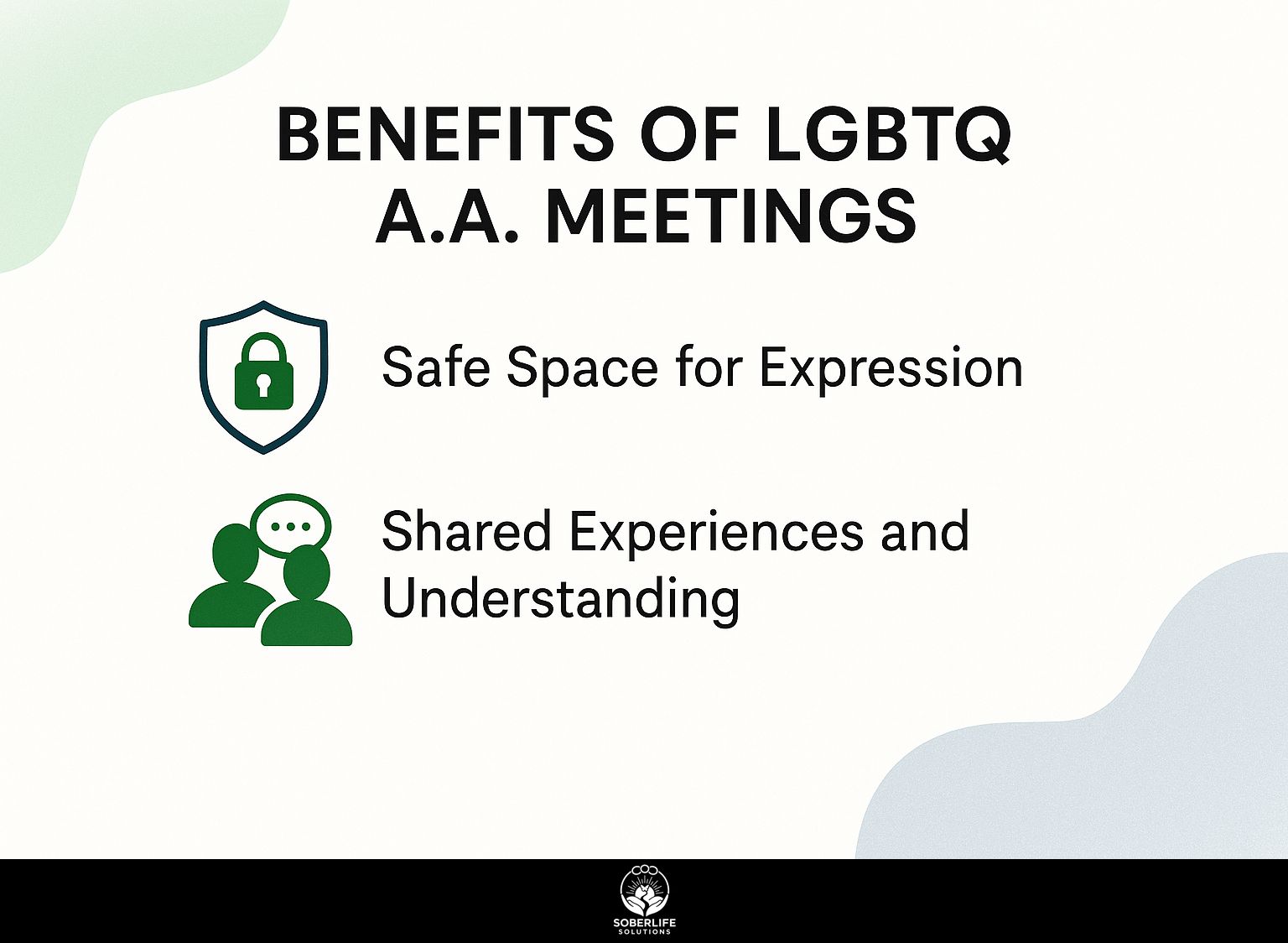
LGBTQ A.A. meetings offer special help that directly addresses the needs of LGBTQ people working on their recovery. For those seeking more specialized community support, exploring our insights on LGBTQ+ peer support groups can provide additional perspective and connection.
Safe Space for Expression
A significant benefit of LGBTQ A.A. meetings is their role as a safe space where individuals can freely express their identities without fear of judgment.
In these settings, members often share their stories with a level of openness that may be stifled in traditional meetings. For example, a transgender person might find it more comfortable to talk about their path to sobriety without worrying about being misunderstood.
Many groups use peer support models, where volunteers act as mentors to newcomers. This builds connection and trust, helping people discuss their addiction experiences in a supportive environment. Recognizing common challenges helps create a supportive group, showing that healing is achievable for all, no matter who they are.
Shared Experiences and Understanding
Participants in LGBTQ A.A. meetings often find a deeper connection through shared experiences, leading to improved emotional support.
This connection comes from knowing the specific difficulties people in the community face, like stigma or discrimination.
By sharing personal stories, members create an environment where empathy flourishes, allowing for authentic interactions. For example, when a person shares their recovery story, it can connect strongly with another’s challenges, creating a feeling of community.
Support groups use this approach to help people feel acknowledged and listened to. Engaging in group activities, such as workshops or social events, further strengthens these bonds and promotes collective healing.
Finding LGBTQ A.A. Meetings
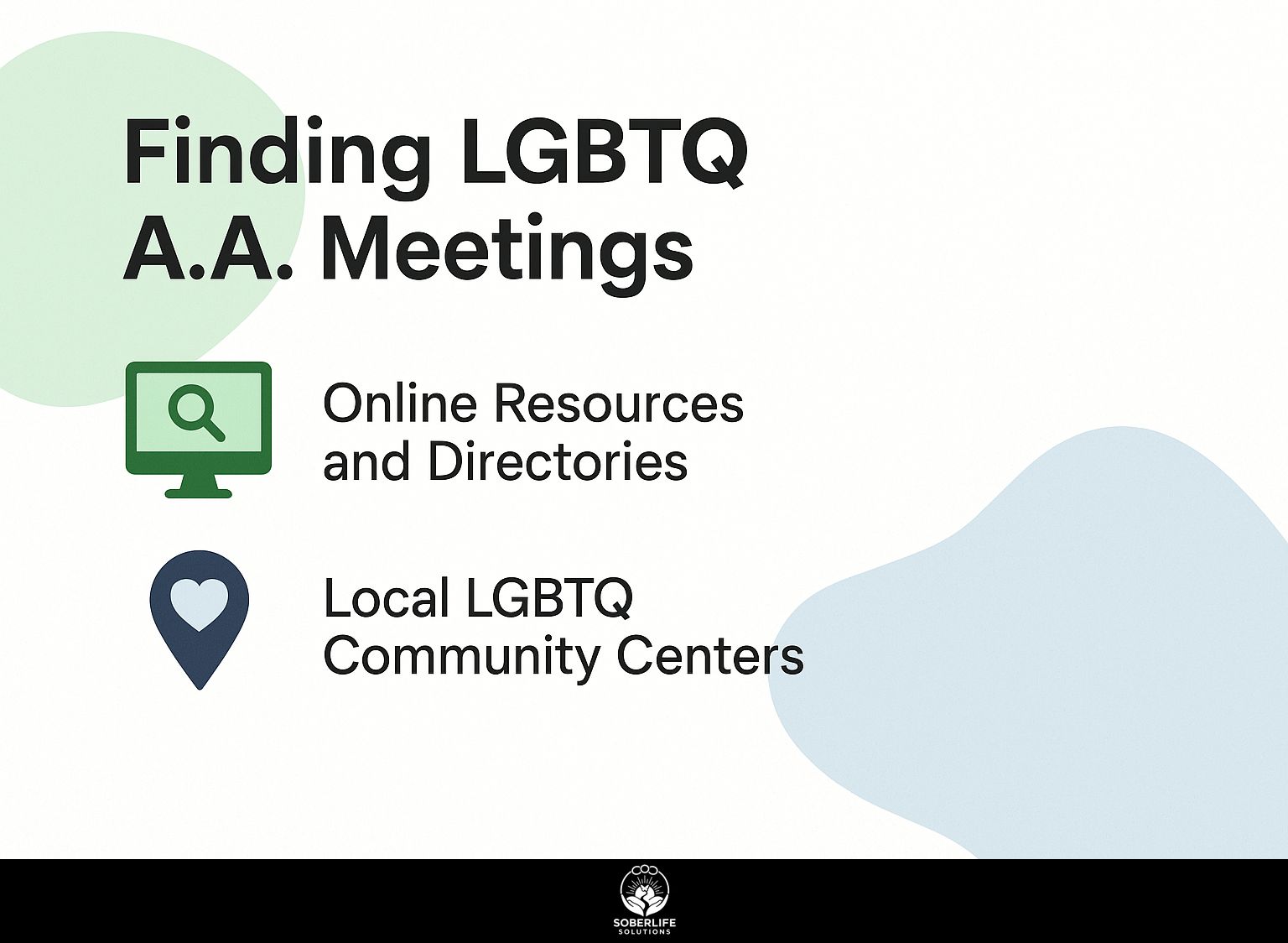
Finding LGBTQ A.A. meetings is now simpler with many online resources and community centers that help with recovery.
Online Resources and Directories
Websites such as GaL-AA.org and Alcoholics Anonymous offer complete lists to find LGBTQ A.A. meetings, available both online and face-to-face.
These directories allow users to filter meetings by location, time, or type of meeting (in-person or virtual).
For instance, GaL-AA.org offers an interactive map feature to easily locate nearby meetings, while the main Alcoholics Anonymous site has a dedicated section for LGBTQ meetings.
To maximize your search, consider using additional resources like Meetup.com to find community events or local support groups. For those seeking specialized community support, our guide on LGBTQ+ Peer Support Groups highlights tailored resources that can significantly enhance your journey.
By combining these tools, you can effectively find a supportive A.A. community that fits your needs.
Local LGBTQ Community Centers
Local LGBTQ community centers often host A.A. meetings, offering a familiar environment where members can feel at home.
To find these centers, start by searching online directories like LGBTQ Center Directory or using local community resource websites.
Some examples include the Los Angeles LGBT Center, which offers specialized A.A. meetings designed for LGBTQ individuals, creating a supportive recovery environment. In New York, the Center offers similar resources, often integrating wellness programs that promote mental health alongside sobriety.
These centers play a key role in creating friendly environments, encouraging community participation, and reducing stigma about substance use issues within the LGBTQ community. For context, an in-depth directory provided by DC.gov lists several organizations that contribute to these efforts by offering tailored programs and fostering inclusivity.
What to Expect at LGBTQ A.A. Meetings
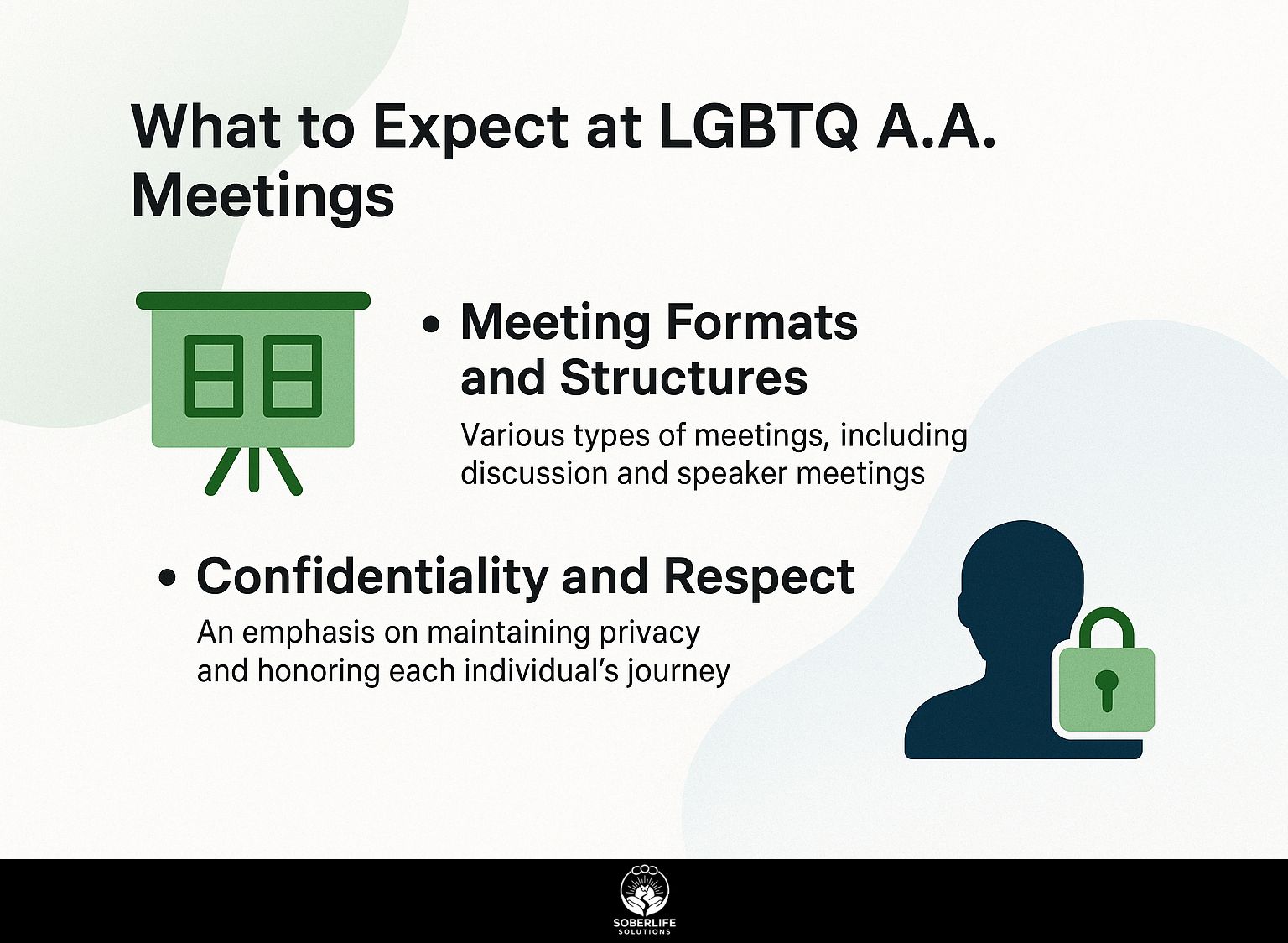
Knowing what happens at LGBTQ A.A. meetings can help newcomers feel at ease and ready to participate in recovery.
Meeting Formats and Structures
LGBTQ A.A. meetings typically follow formats like discussion meetings, speaker meetings, and workshops, each designed to facilitate engagement.
Discussion meetings promote open conversation, letting participants share their experiences and thoughts in a welcoming setting.
In contrast, speaker meetings feature a designated speaker who shares their story, providing inspiration and a structured narrative for attendees.
Workshops are more interactive, often focusing on specific topics like coping strategies or recovery tools, with participants engaging in exercises or group discussions.
Each format helps build community, improve awareness, and offer practical support specifically designed for the unique difficulties faced by LGBTQ individuals in recovery.
Confidentiality and Respect
Confidentiality is a cornerstone of LGBTQ A.A. meetings, creating an environment where participants can share openly without fear of exposure.
This confidentiality is upheld through clear guidelines, such as maintaining anonymity and prohibiting the use of names or identifying details.
Members are encouraged to limit discussions to their own experiences and refrain from sharing stories of others outside the meeting. Facilitators often remind participants at the beginning of each session to respect the privacy of peers.
These steps build trust and help members feel safe to share their problems and successes, improving how the community supports each other.
How to Get Involved
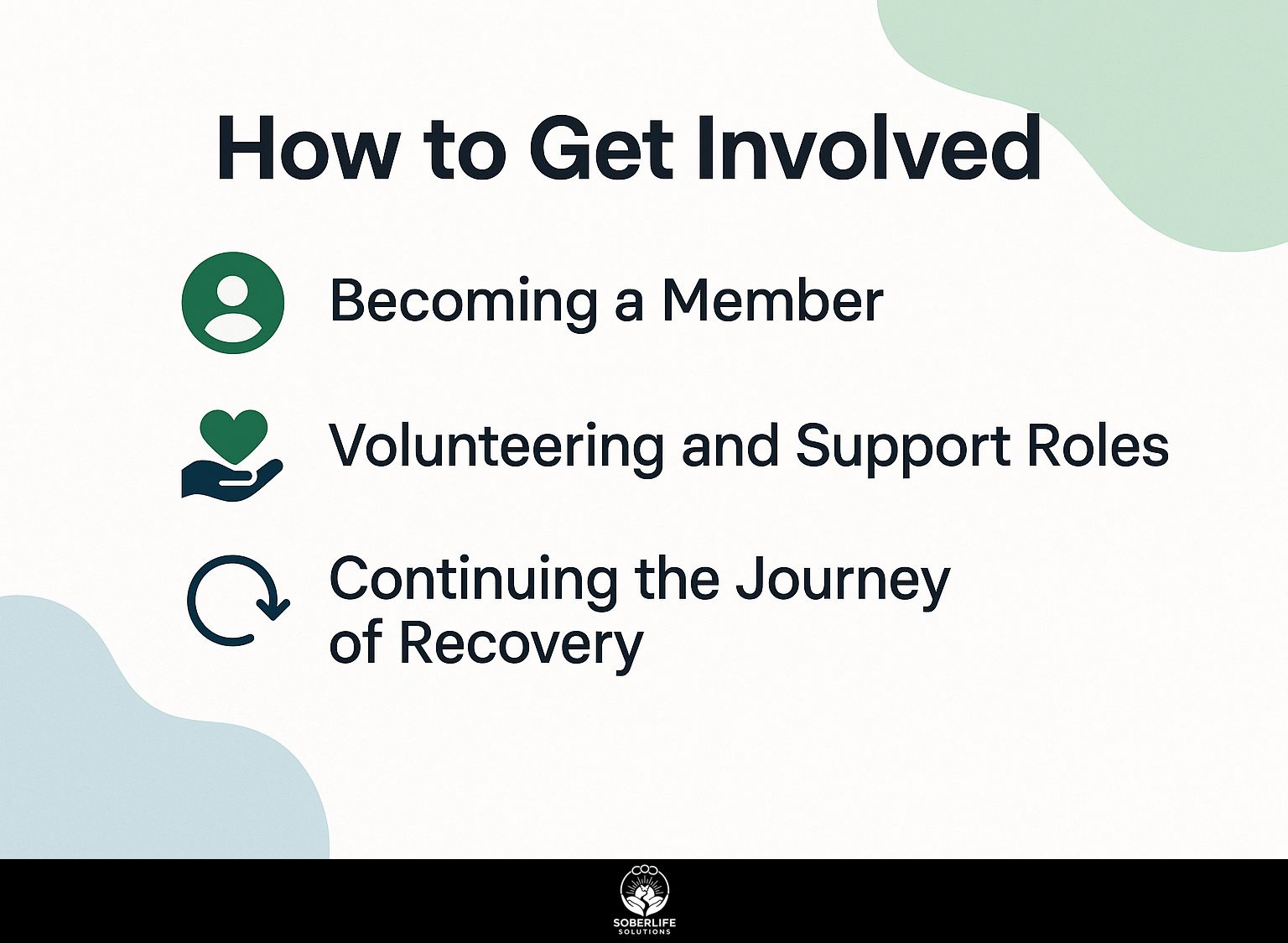
Joining LGBTQ A.A. meetings can greatly improve your recovery by building community connections and support.
Becoming a Member
Joining LGBTQ A.A. meetings typically involves simply attending a meeting and introducing oneself, creating an immediate sense of belonging.
At the meeting, you’ll talk about your experiences and hear from others, creating a helpful atmosphere. It’s helpful to participate regularly so you can build connections and establish trust within the group.
Participating in group tasks or community service can strengthen the feeling of belonging for many members. Having a friend with you can reduce nervousness and motivate others to participate, creating a welcoming recovery environment for all.
Volunteering and Support Roles
Helping out at LGBTQ A.A. meetings supports the community and strengthens one’s dedication to staying sober and self-improvement.
There are important positions available for volunteers in LGBTQ A.A. meetings, such as Chairperson, Secretary, and Sponsor.
The Chairperson runs meetings and makes the environment friendly; for example, Alex, who has been a member for a long time, turned his group into a safe place that supports open conversation.
The Secretary arranges meetings and distributes information to keep everyone informed about upcoming events.
Sponsors are essential in helping new members during their recovery, just like Jamie, who has helped many newcomers feel part of the community. Related insight: How to Access and Update A.A. Meeting Lists: A Guide
Continuing the Journey of Recovery
Staying on the path to recovery often means going to meetings and talking with other members for continuous help.
Going to regular A.A. meetings is important for staying sober over time. To integrate this into your daily life, consider setting a specific day and time each week to attend, such as Monday evenings.
Use tools like Meeting Guide or A.A.’s website to find local meetings that fit your schedule. Establishing a support system by connecting with a recovery buddy can increase accountability.
You might also benefit from creating a personal reminder system, such as calendar alerts on your phone, ensuring that attendance becomes a consistent part of your routine.
Frequently Asked Questions
What is an LGBTQ A.A. meeting?
An LGBTQ A.A. meeting is a gathering for people in the LGBTQ community who are looking for assistance and support with alcohol addiction. It is a safe and inclusive space for members to share their experiences, struggles, and receive peer support.
What is the importance of an LGBTQ A.A. meeting?
An LGBTQ A.A. meeting is important because it offers a safe and welcoming space for people in the LGBTQ community to find help for their alcohol addiction. It also helps to reduce the negative perceptions about addiction in the LGBTQ community and builds a feeling of togetherness and awareness among its members.
How can I find an LGBTQ A.A. meeting in my area?
You can find an LGBTQ A.A. meeting in your area by searching online for local A.A. meetings and filtering for LGBTQ-specific groups. You can also reach out to your local LGBTQ community center or A.A. hotline for more information and resources.
What should I expect at an LGBTQ A.A. meeting?
At an LGBTQ A.A. meeting, you can expect to find a welcoming and non-judgmental atmosphere where members share their experiences, struggles, and offer support to one another. The meetings may follow a specific format, such as the 12-step program, and may include group discussions and personal sharing.
Can anyone attend an LGBTQ A.A. meeting?
Yes, LGBTQ A.A. meetings welcome anyone looking for help with their alcohol addiction, no matter their sexual orientation or gender identity. These meetings are inclusive and welcome individuals from all backgrounds to participate and share their stories.
Do I have to be a member of A.A. to attend an LGBTQ A.A. meeting?
No, you do not have to be a member of A.A. to attend an LGBTQ A.A. meeting. These meetings are open to all and do not require any specific membership or registration. If you think the meetings are useful, you can become a member of A.A. and keep attending LGBTQ A.A. meetings for continued support.

